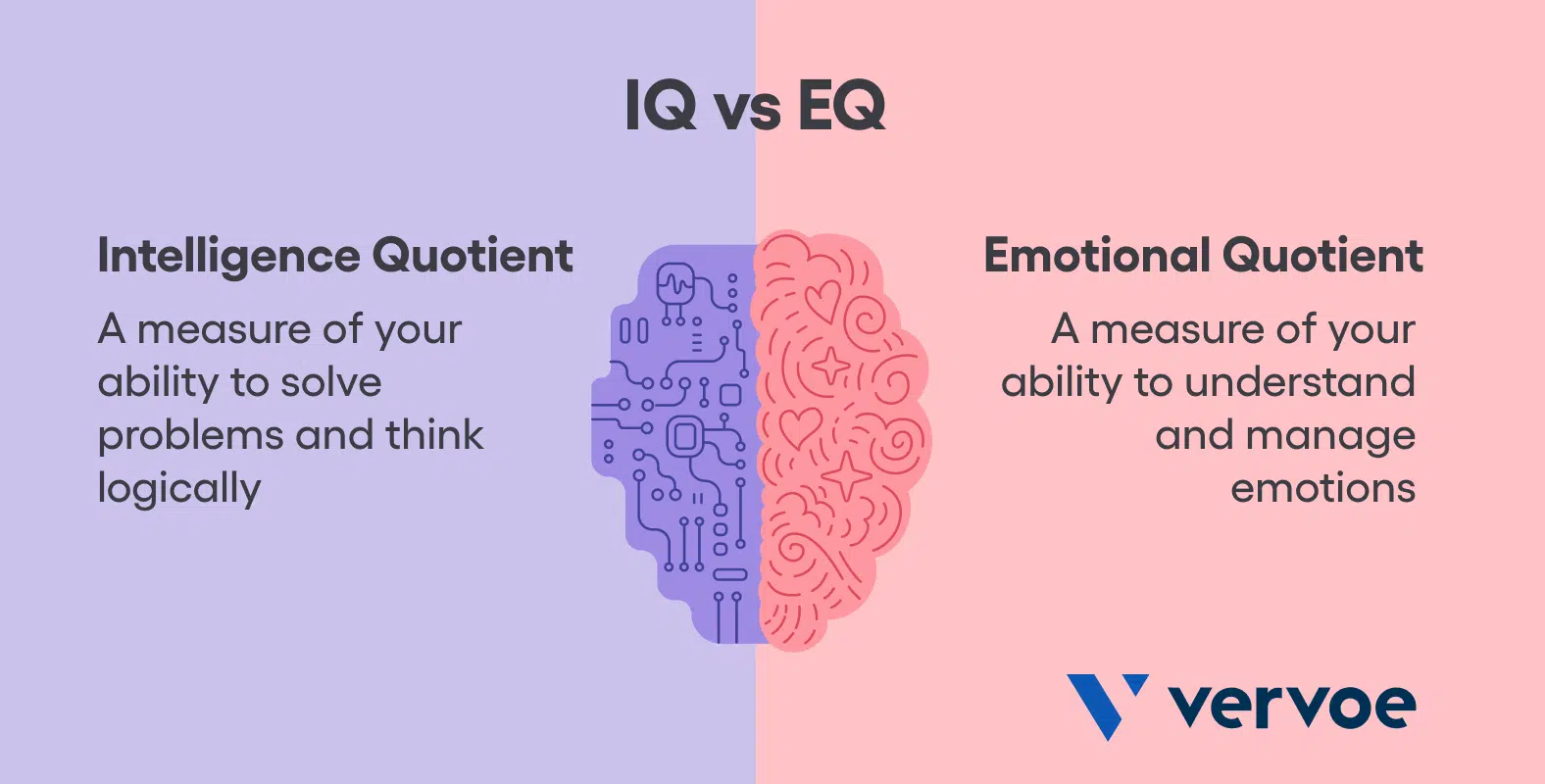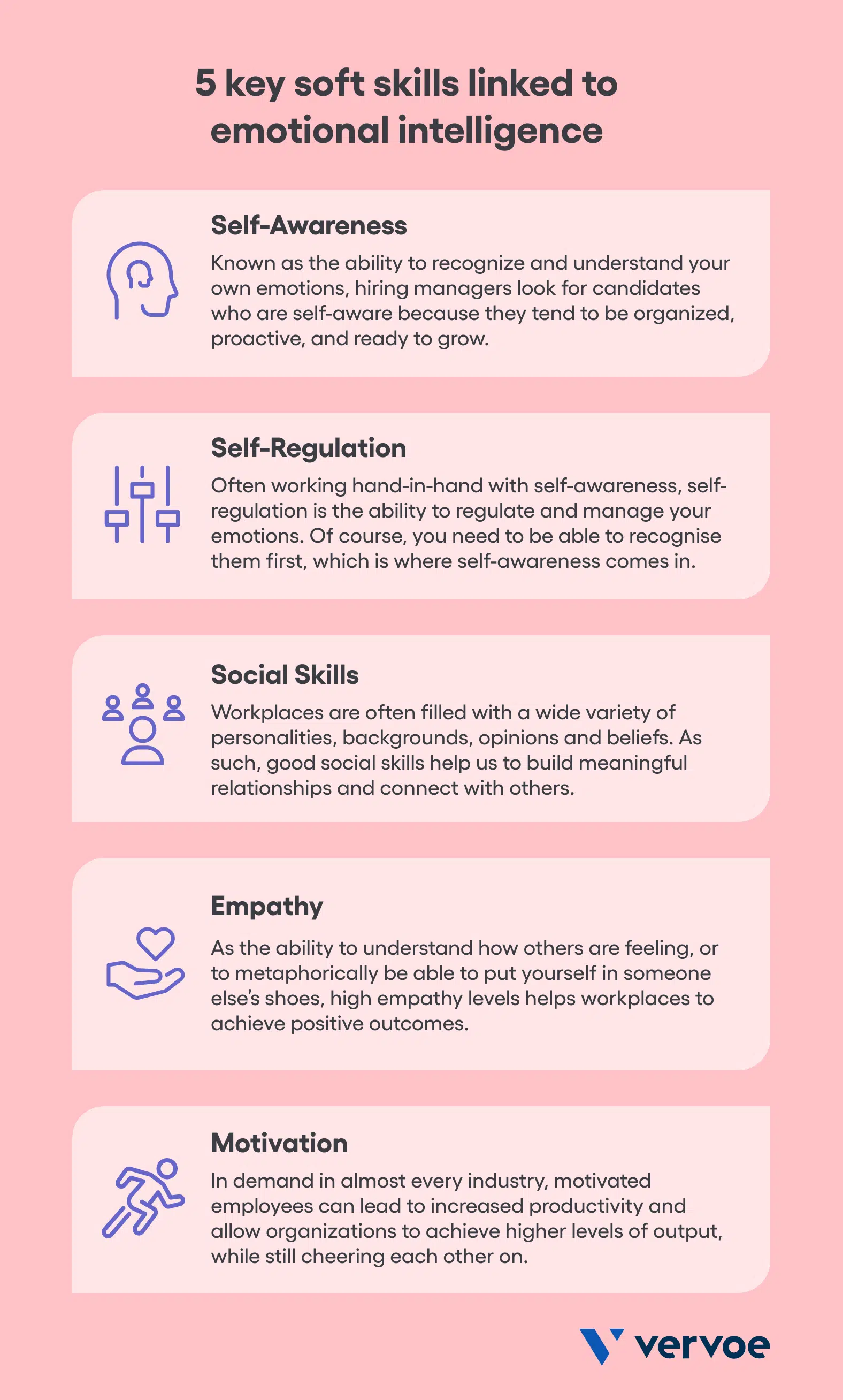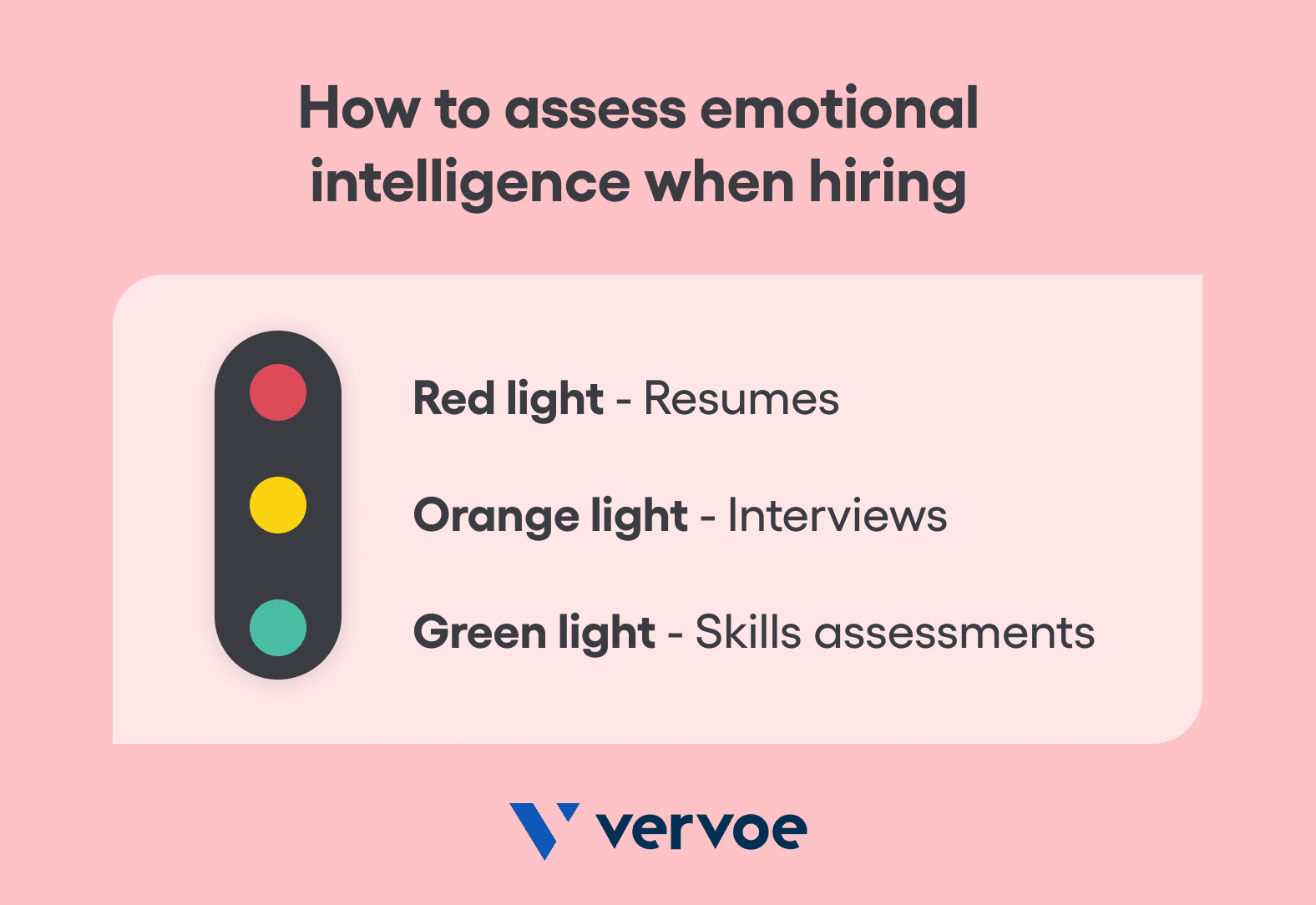When considering the strengths and weaknesses of new talent, there’s a reason why emotional intelligence is high on the list of in-demand soft skills at work.
What’s more important in determining career success: cognitive intelligence (IQ) or emotional intelligence (EQ)? While the debate is ongoing, a better argument is perhaps considering intelligence as a full spectrum of hard and soft skills.
As the psychologist Howard Gardner suggests, intelligence is not simply a single general ability. In fact, there are multiple types of intelligences, and people may have strengths in a number of different areas.
Traditionally, hirers have tended to focus on a candidate’s hard skills in the recruitment process, which delves into whether they have the job skills, experience, knowledge, and expertise.
Unfortunately, where they may be falling short is uncovering the elusive soft skills of a candidate, which are the expressions of EQ, or emotional intelligence.
The good news is that a recent World Economic Forum survey found that emotional intelligence is currently one of the ten most in-demand skills by employers – but what’s all the fuss about?
What is emotional intelligence?
In the mid nineties, the Harvard Business Review hailed emotional intelligence as “a ground-breaking, paradigm-shattering idea” that remains to date as one of the most “influential business ideas of the decade” – so what exactly is emotional intelligence?
Most of us are familiar with the concept of IQ (intelligence quotient), which is a measure of your ability to solve problems and think logically. In contrast, EI or EQ (emotional intelligence quotient) instead measures your ability to understand and manage emotions.
Famous faces that are known for their high levels of emotional intelligence include Princess Diana, Richard Branson, Oprah and even Yoda, so there’s a growing cohort that believe your EQ can have a greater influence on your success in life than your IQ.
As the above celebrities showcase, EQ is an important asset to have for both personal and professional success, as having a high level of emotional intelligence ultimately helps people to handle interpersonal relationships empathetically and judiciously.
Unlike hard skills, which are related to knowledge, emotional intelligence is a set of soft skills that relate to – you guessed it – emotions.
According to Dr Ben Palmer, Founder EQ consulting firm Genos International, breaking down the core functions of emotional intelligence in our day to day lives include the following abilities:
- Perceive and understand emotions within ourselves
- Read emotions in others and demonstrate empathy
- Express how we feel and reason with emotions
- Manage emotions in ourselves and others
While the concept has become a bit of a buzzword in business circles, statistics from Harvard, Stanford, and Carnegie Foundation show that up to 87% of success stems from emotional intelligence.
From recruiting, promoting and developing their teams to shaping company culture and fulfilling their mission, values and goals, it therefore shouldn’t come as a surprise to learn that companies including Amazon, Tesla, and American Express are all known for using emotional intelligence to drive organizational success.

What are the five key soft skills linked to emotional intelligence?
Soft skills is an umbrella term that describes key personal attributes that enable someone to interact effectively and harmoniously with other people.
Unlike hard (technical) skills, they’re not necessarily something you’ll learn in a course, like data analytics or programming. Instead, they reflect your communication style, work ethic, and work style.
In commercial settings, soft skills is a term often used interchangeably with emotional intelligence. While they’re not quite the same thing, there are five key soft skills that someone with a high EQ will almost certainly possess.
Self-Awareness
Known as the ability to recognize and understand your own emotions, hiring managers look for candidates who are self-aware because they tend to be organized and proactive. Without a good level of self awareness in the workplace, employees find it difficult to manage their time and perform at their peak on a regular basis.
A candidate who is self-aware may:
- Ask for constructive feedback from their peers
- Implement techniques like meditation or journalling to help pay attention to their thoughts and emotions
- Work on personal development through goal-setting, a growth mindset, and pursuing passions
Self-Regulation
Often working hand-in-hand with self-awareness, self-regulation is the ability to regulate and manage your emotions. Of course, you need to be able to recognise them first, which is where self-awareness comes in. If you can’t self-regulate, you can’t self-soothe, making you more prone to outbursts or inappropriate responses.
A candidate who is able to self-regulate may:
- Approach a challenge as an opportunity
- Can soothe difficult emotions via breathwork, positive self-talk, or cognitive reframing
- Communicate clearly and take action to diffuse conflict amongst team members
Social Skills
Workplaces are often filled with a wide variety of personalities, backgrounds, opinions and beliefs. As such, good social skills help us to build meaningful relationships and connect with others, even if we might not agree with them all of the time.
A candidate with strong social skills may:
- Demonstrate active listening
- Show interest in others and ask open-ended questions
- Communicate confidently verbally and through body language
Empathy
The world would likely be a far better place if we all embraced empathy a little bit more. As the ability to understand how others are feeling, or to metaphorically be able to put yourself in someone else’s shoes, high empathy levels helps workplaces to achieve positive outcomes between clients and co-workers alike.
A candidate with empathy may:
- Share their own feelings and aren’t afraid to be vulnerable
- Show extra care or concern for someone who’s suffering
- Engage in a social or community cause
Motivation
Almost every employer would say that they hold motivated staff in high regard, but this soft skill should come from a good place and not out of a need for validation. Motivated employees can lead to increased productivity and allow organizations to achieve higher levels of output, while cheering each other on.
A candidate with motivation may:
- Take initiative and be innovative
- Set small, measurable goals
- Celebrate positive results
It is clear to all that hard or technical skills are essential in determining a candidate’s ability to perform well in a job. However, if you’re not hiring emotionally intelligent people, you’re not offering your company or your client access to the talent they deserve.

Why is emotional intelligence important in the workplace?
Once upon a time, showing your emotions at work was discouraged, frowned upon and even considered frightening.
Today, the rapid rise and recognition of soft skills means that a growing number of workplaces are consciously pursuing team members with a high EQ – not just those with well-developed hard skills.
It took almost a decade after the term was first coined in the late nineties for Rutgers psychologist Daniel Goleman to establish the importance of emotional intelligence to business leadership. In 1998, in what has become one of Harvard Business Review’s most enduring articles, “What Makes a Leader”, he states unequivocally:
“The most effective leaders are all alike in one crucial way: they all have a high degree of what has come to be known as emotional intelligence. It’s not that IQ and technical skills are irrelevant – they do matter, but they are the entry-level requirements for executive positions. My research, along with other recent studies, clearly shows that emotional intelligence is the sine qua non of leadership. Without it, a person can have the best training in the world, an incisive, analytical mind, and an endless supply of smart ideas, but he still won’t make a great leader.”
Since then, and more so since the arrival of the global pandemic, it is undeniable that emotions play an important role in all aspects of our lives: and yes, that includes work.
This is due to the direct effect emotions have on our behavior. Keep in mind that emotions show up in our tone of voice, our facial expressions, and in our body language. Whether we like it or not, our emotions are fundamental to how we connect, communicate and collaborate with others – all of which are essential in just about any job.
With finely tuned emotional intelligence – understanding our emotional triggers, how they might play out in our behavior, and adjusting them accordingly – we can individually and collectively create a harmonious workplace culture.
In addition, it’s worth remembering that a harmonious workplace culture is not only beneficial for the mental wellbeing of team members, boosting productivity and increasing staff retention, but it also helps companies be more profitable and provides a sustainable competitive advantage. This philosophy applies to entry level employees, mid tier managers and CEOs alike.
If you’re already converted to the idea of consciously hiring for emotional intelligence, it can be tricky to know where to start. While the process isn’t as straightforward as asking your candidates to take an emotional intelligence test, there are plenty of tools to measure their potential soft skills.
What is the best way to determine emotional intelligence before hiring?
People arrive at the conclusion of hiring for emotional intelligence for a variety of reasons. For some, it’s a case of realizing that technical skills alone are not enough to succeed in a role, while for others, they’re simply aiming for a drama-free office.
Whatever the logic, soft skills like emotional intelligence can’t be assessed in a personality test, on a resume, or even in face to face interviews.
Taking the time to conduct reference checks may give you an indication of what a candidate is like to work with, but asking the right questions during the interview stage may provide you with a bit more clarity.
Keeping in mind that not everyone performs at their best during face to face interviews, and the process is often riddled with human bias.
This may sound obvious but without realizing it, through our own emotional sensitivities, it can be easy to allow candidates to give vague answers without delving deeper through follow-up questions.
Behavioral interview questions that get job candidates to describe how they acted in past situations or would in future situations, are a great way to test emotional intelligence in an interview.
Ask questions such as:
- Tell me about a time someone criticized your work. How did you respond?
- Tell me about a time when you had to solve a problem under pressure?
- Can you tell me about a situation at work that made you feel frustrated?
- Describe a time a change was instituted that you didn’t agree with and what followed.
Being attuned not only to the candidate’s verbal responses but also to how comfortable they appear when answering the uncomfortable questions, are good indicators of a high EQ. If a candidate shuffles around in their chair, freezes up or stumbles, it’s likely you need to keep pressing for some authentic answers.
However, there is a newer option that a growing number of hiring managers are turning to as a data-driven emotional intelligence test: a skills assessment.

How can skills assessments uncover emotional intelligence?
Emotional Intelligence will look different in many different roles, so it’s imperative to define what “high” EQ looks like in the context of the job. As an example, strong social skills and self-awareness would be beneficial in a sales role, but a director will need to demonstrate high emotional regulation.
Once you have clearly defined what emotional intelligence looks like on the job, you can create job simulation questions using skills assessment tools like Vervoe to test a candidate’s emotional intelligence skills that are relevant to the role.
Building assessments where candidates engage through audio and video recordings, as well as written responses will reveal how they are likely to behave in real life work situations.
What’s more, is that users can also incorporate technical or hard skills into their job simulation to effectively kill two birds with one stone.
To see how a candidate would perform in a role, the logical approach is to put them in a situation that matches the tasks and challenges they would face as closely as possible. A job simulation for a sales position could put candidates inside of a CRM style terminal, and assess them in a scenario where multiple deals have fallen over in the last 24 hours.
In the job simulation, they’re going to miss their targets. As the hiring manager, you’ll be in the position to assess their emotional state, and how they manage it. These soft skills are often ignored during the hiring process, but will provide an unparalleled insight into the candidate’s self-awareness and adaptive coping strategies.
Are you ready to join the skills-first revolution?
A growing number of organizations are becoming increasingly aware of the fact that resumes, personality tests and even job interviews aren’t effective tools to assess talent – but what’s the alternative?
Vervoe is an end-to-end AI-powered solution that is proudly helping organizations to transform their hiring processes with skills testing, job simulations, and machine learning recruitment.
We predict performance by creating role specific skills assessments and job simulations. Not only does this level the playing field for candidates by removing potential bias, but we uncover skills at scale by revealing who can walk the walk, and not just talk the talk.
Ultimately, our job simulations focus on the work — and not the person. To see people do the job before they get the job, book a demo today and let our experienced team run you through Vervoe’s full range of ready-made and tailored solutions.




















